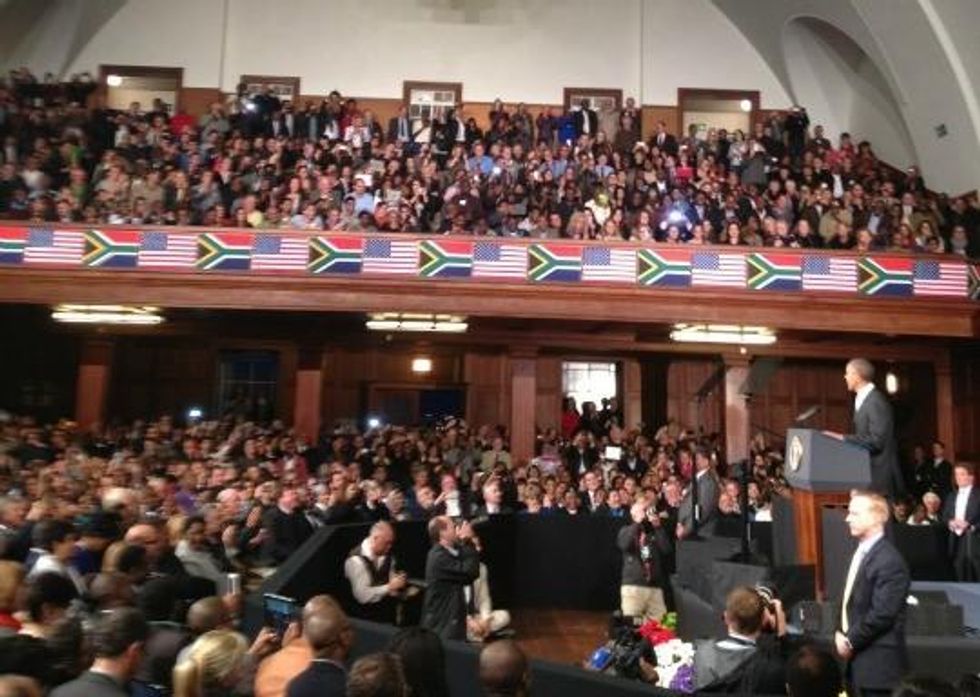

SUBSCRIBE TO OUR FREE NEWSLETTER
Daily news & progressive opinion—funded by the people, not the corporations—delivered straight to your inbox.
5
#000000
#FFFFFF
To donate by check, phone, or other method, see our More Ways to Give page.


Daily news & progressive opinion—funded by the people, not the corporations—delivered straight to your inbox.

Rounding out his multi-state African tour Monday, US President Barack Obama pledged a new era of "partnership" with the continent, promising "an end to famine and a thriving African agricultural industry." However, critics and food sovereignty advocates--wary of such remarks--want to know who gets to "thrive" and at what cost.
Speaking before a crowd Sunday at the University of Cape Town, President Obama touted a "new alliance of governments and the private sector" and the billions spent on agricultural research that "grows more crops"--words frequently used as doublespeak for Big Agriculture's genetically modified organism (GMO) technology.
He said:
For one thing, we believe that countries have to have the power to feed themselves, so instead of shipping food to Africa, we're now helping millions of small farmers in Africa make use of new technologies and farm more land. And through a new alliance of governments and the private sector, we're investing billions of dollars in agriculture that grows more crops, brings more food to market, give farmers better prices and helps lift 50 million people out of poverty in a decade. An end to famine, a thriving African agricultural industry -- that's what opportunity looks like. That's what we want to build with you.
"A lot of concerns are being raised in Africa around this question of food sovereignty," Emira Woods, co-director of Foreign Policy In Focus at the Institute for Policy Studies, told The Real News Network ahead of the speech. "It sounds great when we think about this new alliance for food. You know, increasing yields, increasing productivity all sound fantastic."
However, she added, "if you look beyond the mask, beyond the title," what you see is what many are calling a land grab by multinational corporations, or an appropriation of much of the "last remaining arable land on this planet."
Woods cites a number of issues with these policies including communities and longtime residents being forced off their ancestral lands, the rise in biofuel production and, namely, efforts by "US agribusiness companies to expand their production of genetically modified foods."
She continues:
I think the concerns are often that small- and medium-size farmers, their practices to actually feed their families, their communities, their region will be pushed aside as large agribusiness firms, particularly U.S. and European companies, swoop in in efforts to appropriate land for large-scale agricultural production that can feed the interest of U.S. particularly biofuel industries and others outside of Africa.
In addition to heralding this new public-private partnership, Obama took the opportunity to specifically promote his agricultural development program Feed the Future under which the US "will lead efforts to end famine in Africa" by increasing "global food security" and "nurturing African agribusiness," MSNBCreports.
Since its unveiling in 2009, Congress has pledged over $3.5 billion to the program and as Alex Park from Mother Jones explains, US businesses have quite a bit to profit from this initiative:
Broadly speaking, the idea behind Feed the Future is to grow more food than ever before by making it easier for global agribusiness companies to invest in poor countries. As USAID head Rajiv Shah indicated at the official unveiling of Feed the Future in 2010, the agency could advocate on companies' behalf to make investment easier in partner countries.
"If you're from the private sector, tell us what countries and donors can do to reduce constraints on business operations," he said.
The US government appears to already be doing this, as a recent analysis of dumped embassy cables found that the State Department had lobbied governments around the world to adopt policies allowing for the cultivation of genetically modified crops.
According to Park, as of 2012 roughly $1 billion of the funds had thus far been dispersed through USAID to companies such as PepsiCo, Walmart, and General Mills for programs in partnership with farmers in Africa and Central America that promote agriculture for the Big Food brands.
You can watch Emira Woods' interview with Real News below:
Is Obama's Trip to Africa about Investment or the Extraction of African Resources?Emira Woods: Obama administration needs a new approach to trade and investment and should move away from policies that ...